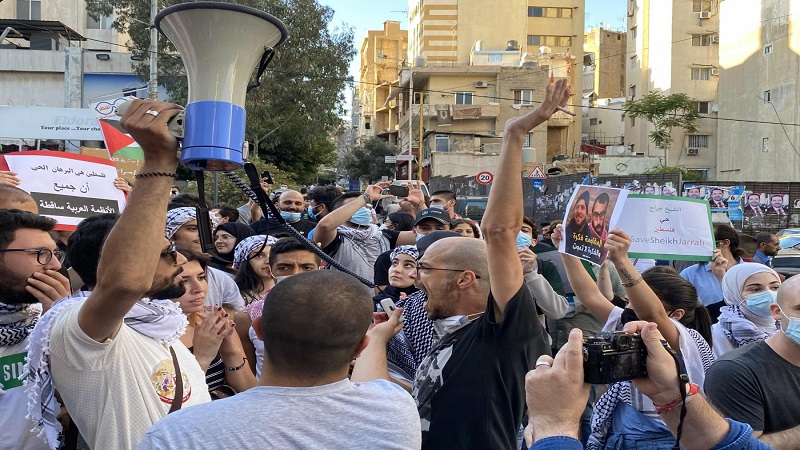Lebanese and Palestinians on Tuesday demonstrated in Beirut against Israel’s plans to forcibly expel Palestinian families from the neighbourhood of Sheikh Jarrah in occupied East Jerusalem.
Protesters gathered at the Mar Elias refugee camp in southern Beirut and marched over 2km south to the Chatila refugee camp, snaking through the narrow streets as residents looked on.
Later this evening, demonstrators are due to gather at Martyrs’ Square in downtown Beirut.
“People are being systematically removed from their land, memory and livelihoods,” Maher Abou Shackra of independent Lebanese political group Li Haqqi told Middle East Eye.
“Behind state borders and ridiculous political divisions, there is one body, one heart and one pulse for one human community that hates injustice and loves justice and peace.”
Over the past week, Palestinians in the occupied East Jerusalem neighbourhood of Sheikh Jarrah have been protesting against an Israeli court order that would evict 40 Palestinians, including 10 children, from their homes and replace them with Israeli settlers.
Sporadic protests took place on Sunday and Monday in Beirut’s Martyrs’ Square, as well as at the Chatila and Mar Elias Palestinian refugee camps.
Rights denied
About 192,000 Palestinian refugees live in Lebanon, and over half are unemployed according to Unicef. In addition to mostly residing in overcrowded and poorly equipped UNRWA-administered refugee camps, the Lebanese government has denied them most of their basic human and economic rights, and has banned them from working in over two-dozen jobs.
Aya Majzoub, Lebanon researcher at Human Rights Watch, said these discriminatory policies had played a role in worsening living conditions for most Palestinians in Lebanon.
“Lebanon has marginalised Palestinian refugees for too long,” Majzoub told MEE. “Forced to work illegally and without legal protection, Palestinians face severe discrimination in wages and hiring.”
Some Lebanese have long called for legislative reforms that would reverse these laws, including the ban on Palestinians receiving Lebanese nationality. Although those who favour such reforms are a minority, and such changes are unlikely to take place under the country’s fragile sect-based power-sharing system, they believe the move would show genuine solidarity with Palestinians.
“I absolutely support giving Palestinians their full civil and social rights in Lebanon,” Abou Shackra said. “All issues related to rights are indivisible.”
Lebanon is going through a crippling economic crisis that has devalued its local currency by over 80 per cent and rendered over half its population, including over 1.5 million refugees, into poverty.
Source: Middle East Eye






 WhatsApp us
WhatsApp us 

